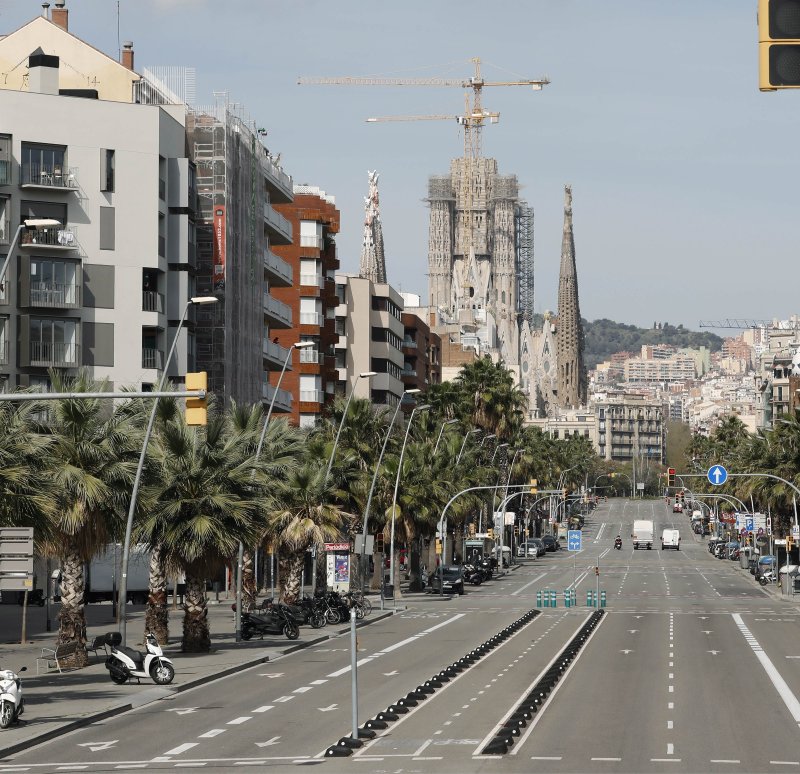By UPI Staff

An almost empty Marina Street is seen in Barcelona, Spain, during a COVID-19 lockdown on March 21, 2020. Wednesday's report said Barcelona saw one of the largest decreases in air pollution-related deaths during the lockdown in 2020.
File Photo by Andreu Dalmau/EPA-EFE
Jan. 26 (UPI) -- Lockdowns during the first phase of the COVID-19 pandemic in 2020 led to improved air quality that probably saved hundreds of lives across dozens of cities in Europe, according to a study published on Wednesday.
The lockdowns were responsible for dramatic improvements in air quality because restrictions resulted in fewer vehicles on the road, the study by experts at the London School of Hygiene & Tropical Medicine said.
As a direct result, researchers said, about 800 fewer people died.
The study examined the air quality in nearly 50 cities across Europe and their corresponding death rates. Some of the top cities where improved air quality resulted in fewer deaths included Paris, London, Barcelona and Milan.
"The study compared government policies from 47 European cities from February to July 2020 and estimated the changes in pollution levels and related number of deaths avoided during the first wave of COVID-19 pandemic," the London school said in a statement Wednesday.

Children ride scooters past the Eiffel Tower in Paris, France,
Jan. 26 (UPI) -- Lockdowns during the first phase of the COVID-19 pandemic in 2020 led to improved air quality that probably saved hundreds of lives across dozens of cities in Europe, according to a study published on Wednesday.
The lockdowns were responsible for dramatic improvements in air quality because restrictions resulted in fewer vehicles on the road, the study by experts at the London School of Hygiene & Tropical Medicine said.
As a direct result, researchers said, about 800 fewer people died.
The study examined the air quality in nearly 50 cities across Europe and their corresponding death rates. Some of the top cities where improved air quality resulted in fewer deaths included Paris, London, Barcelona and Milan.
"The study compared government policies from 47 European cities from February to July 2020 and estimated the changes in pollution levels and related number of deaths avoided during the first wave of COVID-19 pandemic," the London school said in a statement Wednesday.

Children ride scooters past the Eiffel Tower in Paris, France,
during a COVID-19 lockdown on March 26, 2020.
File Photo by Eco Clement/UPI
"Government measures for COVID-19 such as school and workplace closure, canceling public events and stay-at-home requirements had the strongest effect on reducing [nitrogen dioxide] levels. This is linked to the reduction in road transport and local mobility which is known to be a contributor to NO2 air pollution. Spanish, French and Italian cities had the largest decrease in NO2 of between 50% and 60% during the period."
The European Center for Medium-Range Weather Forecasts funded the research, which was led by a team of statistical health and observation satellite modelers at the London school.
"Government measures for COVID-19 such as school and workplace closure, canceling public events and stay-at-home requirements had the strongest effect on reducing [nitrogen dioxide] levels. This is linked to the reduction in road transport and local mobility which is known to be a contributor to NO2 air pollution. Spanish, French and Italian cities had the largest decrease in NO2 of between 50% and 60% during the period."
The European Center for Medium-Range Weather Forecasts funded the research, which was led by a team of statistical health and observation satellite modelers at the London school.
The research was published on Wednesday in Scientific Reports.
Other studies have shown that COVID-19 restrictions and lockdowns in 2020 also had a dramatic effect on climate change, as it removed major sources of greenhouse gases from roads worldwide. A United Nations report last September said, however, that carbon emissions quickly returned after the lockdowns were lifted.
No comments:
Post a Comment